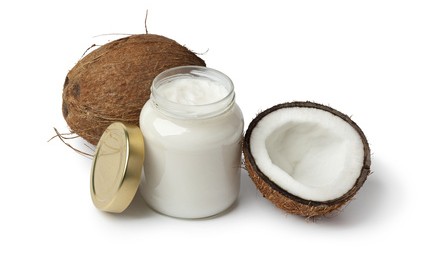Why is coconut oil in so many recipes nowadays? It used to be hard to find, but consumer demand now means that it has a prominent spot in most supermarkets. What’s behind the craze?
The Claims
Coconut oil is becoming increasingly popular. Health claims include burning fat, helping memory, reducing blood cholesterol, stimulating metabolism, improving immune function, helping with sugar cravings, and of course, the ubiquitous promoting weight loss claim. Should we all rush out and buy this wonder food?
The Evidence
Coconut oil is rich in saturated fat (about 90% of its fat is saturated), and years of research have associated saturated fat with heart disease, some cancers, and diabetes. But recent studies suggest that some types of saturated fats, such as the lauric acid in coconut oil, may not be as harmful. The chemical structure of these fats classifies them as “medium chain triglycerides” (MCTs): the body digests and handles MCTs differently, and they might increase “good” HDL cholesterol, but the evidence isn’t clear cut, and the influence on heart disease is unclear. Much of the research on coconut oil has included animal studies and small short-term studies in humans, mostly focused on cholesterol levels.
Overall, the research doesn’t support the many health claims, and there is limited evidence on long-term health effects. Because of the lack of research, we don’t know how coconut oil affects heart disease, stroke risk, or other diseases.
Bottom Line
There’s not enough good data to support the use of coconut oil for health benefits. If you like the flavor and texture of coconut oil in your cooking, it might be a better option than butter and other animal fats, used sparingly.
Current research shows that the healthiest oil to include in your diet is olive oil. Generally, it’s a good idea to get your fats from whole foods, especially plant sources (like nuts, seeds, avocados) and small fish, which contain other health-promoting compounds. You’ll find good information on the best fats for health here.
Finally, remember, all fats are calorie-dense (1/4 cup olive oil has 480 calories), so no matter how healthy, they should fit into your calorie budget, or you may end up carrying excess fat, which is a well-known contributor to many chronic diseases.
More Reading:
- 21 of the best arguments for and against coconut oil (Examine.com)
- Dietary Fats and Cardiovascular Disease: A Presidential Advisory From the American Heart Association
- Here’s What You Really Need to Know About Coconut Oil
It was never a “health food” (ScienceAlert) - Coconut Oil and the Heart (Evidence paper, New Zealand Heart Foundation)
Reviewed and Updated June 21, 2017
>>You can view other foods in the Healthy or Hype? series here.
Share This: